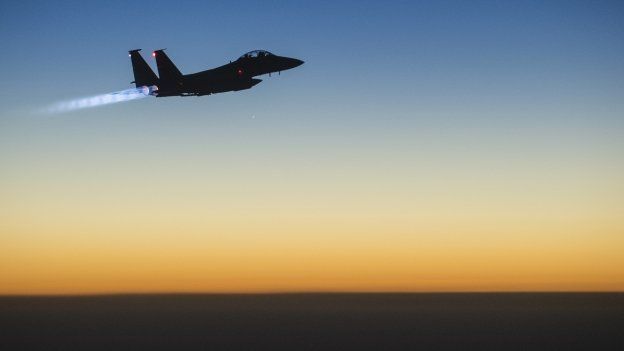Is military force no longer the way to win wars?
- Published

War has changed radically over the past 25 years.
Just how radically is highlighted by going back a little further - consider the current commemoration of the outbreak of World War One.
For all the horror and the suffering, that conflict ended with a clear result - Germany and its allies lost.
World War Two also resulted in a clear victory, as did many smaller conflicts in the post-war period.
The West did not always win. The US ultimately lost the Vietnam War, for example, but the fact remains that military force, one way or another, appeared to deliver clear and definitive outcomes.
Not any longer.
President George W Bush's "mission accomplished speech" on the deck of the aircraft carrier the USS Abraham Lincoln, in May 2003, when he famously declared that the US and its allies had "prevailed", rather highlights the problem.
"Victory" - whatever that is - is not just in the eye of the beholder. It rather depends upon when exactly you decide to declare it and move on.
Today, some 11 years later, US troops are back in Iraq - for now as advisers - and US and allied warplanes are striking targets in Anbar province and elsewhere.
Iraq - like Afghanistan - seems far from a victory. Libya too - a small war apparently easily won - looks to have had a far from positive outcome.
These wars, some will say, gave these three countries the chance of a new political start - but they also precipitated vast damage and loss of life, and many might argue that the new political start has largely been squandered.
Broken states
So why cannot military force secure the sort of definitive outcomes that seemed to be achievable in the past? Look more widely today and the problem is the same.
Israel's repetitive conflicts in Gaza appear to achieve little other than maintaining the status quo.
In all of these cases Western-style armies with overwhelming access to the most modern military technologies available either cannot prevail or do so in only a mitigated fashion.
So what's going wrong? What has changed? Is it that military force itself is no longer so useful? If so, why?
Or is it perhaps that military force is being employed in the wrong circumstances or maybe even in the wrong way?
Two things are worth noting. First, the context of war has changed dramatically from inter-state conflict to wars within broken states.
Armies are actually very good at taking on other armies - that after all is what they are trained for and understand.
But battling against shadowy forces inside a failed country whose languages and culture are poorly understood is quite another matter.
The struggle against the so-called Islamic State (IS) in Iraq and Syria could be a turning point in a small way in that from the outset Western leaders and military commanders have all insisted that this is not essentially a problem amenable to a military solution.
Air power may contain IS. Local forces on the ground may roll it back, but this is a social and political struggle for the future of the Middle East, whose existing state system is in deep crisis.
Secondly, the end of the Cold War and the apparent dominant moment of the West prompted all sorts of well-meaning ideas about intervention, some spoke of "a responsibility to protect", a desire to use this pre-eminent military force to good effect.
Along came a related idea - rather than war being a national necessity, a battle for survival, some began to speak of "wars of choice".
Well, after Afghanistan, Iraq and Libya, the world looks a little different.
Many now might argue that war perhaps should never be a choice, it should go back to being a rare necessity.